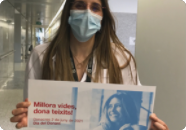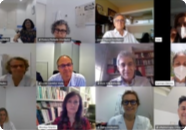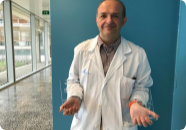- Home
- Citizenship
- Clinical specialties and services
- Sant Joan Despí Hospital, Hospitalet General Hospital
- Intensive Care medicine
Sant Joan Despí Hospital, Hospitalet General Hospital
Intensive Care medicine
- Intensive Care medicine
- Team
- Units and benefits
- Research
- Teaching activity
- Related information
Intensive Care medicine
The Intensive Medicine Service (SMI) is responsible for detecting and treating people in a critical or potentially critical (semi-critical) condition throughout the hospital and the reference area. To carry out this task, the service has advanced systems for monitoring and supporting vital functions.
The service attends to patients inside and outside the Intensive Care Unit, wherever they require it, 24 hours a day, 365 days a year.
Intensive Care Medicine is an open and multidisciplinary specialty. Its professionals maintain a close relationship with the Emergency Department, the Surgical and Resuscitation Area, as well as with other medical areas. It is the team responsible for treating cardiorespiratory arrests in the hospital, leads the hospital transplant program and participates in a large number of hospital committees.
The service has two separate units, one in the main building of the Hospital de Sant Joan Despí, with 18 beds, and the other in building B in the center, with 28 beds.
In addition, there are also four semi-critical care beds in the Obstetrics Care Unit of Hospital General de l'Hospitalet, in charge of the Gynecology and Obstetrics service and with the face-to-face support of the Anesthesiology service.
-
Update date: 01.01.2024
Head of Service
-
Nicolas Rico Villoria
hsjd intensive care unit
healthcare coordinator doctor
-
Elida Amestoy Torre
hsjd intensive care unit
specialist doctor
-
Melinda Rita Popoviciu Koborzan
hsjd intensive care unit
service coordinator doctor
-
Miguel Rodríguez Lopez
hsjd intensive care unit
specialist doctor
-

Patricia Sanchez Rico
hsjd intensive care unit
specialist doctor
-
Sebastian Felipe Valenzuela Becher
hsjd intensive care unit
specialist doctor
-
Xaime Garcia Nogales
hsjd intensive care unit
specialist doctor
In this section appear the professionals of the Integral Health Consortium who have authorized the display of their personal data.
-
Update date: 01.01.2024
Units and benefits
Patients treated at Hospital General de l'Hospitalet, who throughout their evolution require some measure of support that can only be offered at Hospital de Sant Joan Despí, are transferred by medical ambulance to the Medical Service Intensive of the latter center.
In the same way, all those patients who require complex diagnostic or therapeutic techniques typical of third-level hospitals, such as cardiac catheterization, neurosurgery, cardiac surgery, ECMO (extracorporeal membrane oxygenation) or others not available in our center, are transferred to the General Hospital of Bellvitge, which is the center of reference.
- Early care for the seriously ill throughout the hospital
- Assistance to patients with serious or high-risk cardiovascular disease (coronary syndrome, myocarditis, arrhythmias, shock, tamponade, etc.)
- Assistance to patients with serious respiratory diseases
- Assistance to high-risk postoperative patients
- Assistance to patients with serious pathologies of the digestive tract
- Assistance to patients with severe decompensated liver disease
- Assistance to patients with severe metabolic decompensations
- Assistance to patients with severe acute renal failure
- Assistance to patients at risk in hemodialysis
- Assistance to patients with severe bleeding
- Assistance to patients with severe acute neurological pathology or in coma.
- Assistance to neuromuscular patients with serious complications
- Assistance to patients with severe acute poisoning
- Assistance to serious patients with CO poisoning
- Assistance to patients with serious infections and/or sepsis
- Assistance to patients with non-cranioencephalic polytrauma
- Attention to the probable organ donor
- Care for patients with serious dysbaric accidents
- Monitoring of electrocardiography, respiratory rate, non-invasive blood pressure and SpO2
- Invasive blood pressure
- Pulmonary artery catheterization (Swan Ganz)
- Transpulmonary thermodilution method (PiCCO) for hemodynamic monitoring
- Echo-guided central venous catheterization
- Surface electrocardiogram
- Analgesia and sedation monitoring with bispectral index
- Cardiac output monitoring
- Echocardiography of the critically ill patient
- Pulmonary ultrasound
- Capnography in mechanical ventilation
- Intra-abdominal pressure
- Lumbar puncture
- Diagnostic thoracocentesis, paracentesis and pericardiocentesis
- Fibrobronchoscopy, broncho-alveolar lavage and bronchial brushing
- Digestive endoscopy
- Electroencephalogram
- Temporary pacemaker
- Bladder, nasogastric, rectal, jejunal, Sengstaken-Blakemore and Linton-Nachlas probes
- Central venous catheterization: subclavian, jugular, femoral and others
- Electrical defibrillation and synchronized cardioversion
- Advanced life support
- Fibrinolysis ischemic stroke
- Fibrinolysis AMI
- Fibrinolysis in TEP
- Pericardiocentesis and pericardial drainage
- Enteral and parenteral nutrition
- Extra-renal purification (hemofiltration, ultrafiltration, hemodiafiltration, hemodialysis)
- Orotracheal and nasotracheal intubation
- Invasive and non-invasive mechanical ventilation
- prone position
- High flow oxygen therapy
- Therapeutic fibrobronchoscopy
- Evacuating thoracocentesis and pleural drainage
- Percutaneous tracheotomy
- Cricothyroidotomy
- Evacuating paracentesis
- Lumbar puncture
- Epidural analgesia
- Hyperbaric oxygen therapy
- Drainages and surgical washes
-
Update date: 01.01.2024
Research
The service is committed to clinical research in intensive care medicine, and collaborates in national and international studies promoted by scientific societies and leads its own research projects, in the fields of acute respiratory failure and the psychological well-being of patients and their families.
-
Update date: 01.01.2024
Teaching
The service holds two weekly sessions (one bibliographic and one review) aimed at updating knowledge and improving the operation of the service itself, to improve care for our patients every day. A monthly mortality session is held to analyze the assistance given to these cases and identify options for change or improvement.
Intensive Medicine helps train Nursing students, Medical students (in their Cardiology rotation) and training specialists (MIR) in the specialties of Internal Medicine, Anesthesia and Resuscitation, Family and Community Medicine and Geriatrics. He also has the MIR intensive medicine teaching accreditation.
-
Update date: 01.01.2024








